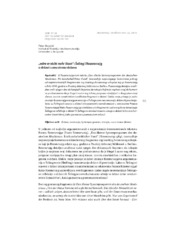'wäre er nicht mehr Staat'. Šeling i Rozencvajg o državi "s onu stranu" države
'wäre er nicht mehr Staat'. Schelling and Rosenzweig on the State and Beyond the State
Апстракт
The surprising thing about “Das älteste Systemprogramm des deutschen Idealismus. Ein handshriftliher Fund,” one of Rosenzweig’s best supported and most carefully detailed texts, is that he almost completely ignores one of the most stunning and mysterious fragments of this brief, two-page manuscript that he discovers in 1914 at the Prussian State Library in Berlin. Not only that: while discussing and justifying in detail every part of this manuscript, attempting to prove that just because it is in Hegel’s handwriting, does not necessarily mean that Hegel is its author, Rosenzweig completely sidelines the famous, completely anarchistic, and radical fragment about the state. My question then is, why does Rosenzweig leave out any argument about Schelling’s understanding of the state? Or more precisely, how have Schelling’s positions on the state been incorporated and transformed in Rosenzweig’s texts? How does Rosenzweig use these fragments? Why does he nowhere thematize Schelling’s though...ts on the state, or what in eine revolutionäre Staatslehre Rosenzweig calls Schelling’s revolutionary teachings on the matter?
Кључне речи:
state / beyond the state / institution / systemprogramm / JewИзвор:
Filozofija i društvo/Philosophy and Society, 2012, 55-64Институција/група
IFDTTY - JOUR AU - Bojanić, Petar D. PY - 2012 UR - http://rifdt.instifdt.bg.ac.rs/123456789/407 AB - The surprising thing about “Das älteste Systemprogramm des deutschen Idealismus. Ein handshriftliher Fund,” one of Rosenzweig’s best supported and most carefully detailed texts, is that he almost completely ignores one of the most stunning and mysterious fragments of this brief, two-page manuscript that he discovers in 1914 at the Prussian State Library in Berlin. Not only that: while discussing and justifying in detail every part of this manuscript, attempting to prove that just because it is in Hegel’s handwriting, does not necessarily mean that Hegel is its author, Rosenzweig completely sidelines the famous, completely anarchistic, and radical fragment about the state. My question then is, why does Rosenzweig leave out any argument about Schelling’s understanding of the state? Or more precisely, how have Schelling’s positions on the state been incorporated and transformed in Rosenzweig’s texts? How does Rosenzweig use these fragments? Why does he nowhere thematize Schelling’s thoughts on the state, or what in eine revolutionäre Staatslehre Rosenzweig calls Schelling’s revolutionary teachings on the matter? T2 - Filozofija i društvo/Philosophy and Society T1 - 'wäre er nicht mehr Staat'. Šeling i Rozencvajg o državi "s onu stranu" države T1 - 'wäre er nicht mehr Staat'. Schelling and Rosenzweig on the State and Beyond the State SP - 55 EP - 64 DO - 10.2298/FID1202055B ER -
@article{
editor = "Milidrag, Predrag",
author = "Bojanić, Petar D.",
year = "2012",
abstract = "The surprising thing about “Das älteste Systemprogramm des deutschen Idealismus. Ein handshriftliher Fund,” one of Rosenzweig’s best supported and most carefully detailed texts, is that he almost completely ignores one of the most stunning and mysterious fragments of this brief, two-page manuscript that he discovers in 1914 at the Prussian State Library in Berlin. Not only that: while discussing and justifying in detail every part of this manuscript, attempting to prove that just because it is in Hegel’s handwriting, does not necessarily mean that Hegel is its author, Rosenzweig completely sidelines the famous, completely anarchistic, and radical fragment about the state. My question then is, why does Rosenzweig leave out any argument about Schelling’s understanding of the state? Or more precisely, how have Schelling’s positions on the state been incorporated and transformed in Rosenzweig’s texts? How does Rosenzweig use these fragments? Why does he nowhere thematize Schelling’s thoughts on the state, or what in eine revolutionäre Staatslehre Rosenzweig calls Schelling’s revolutionary teachings on the matter?",
journal = "Filozofija i društvo/Philosophy and Society",
title = "'wäre er nicht mehr Staat'. Šeling i Rozencvajg o državi "s onu stranu" države, 'wäre er nicht mehr Staat'. Schelling and Rosenzweig on the State and Beyond the State",
pages = "55-64",
doi = "10.2298/FID1202055B"
}
Milidrag, P.,& Bojanić, P. D.. (2012). 'wäre er nicht mehr Staat'. Šeling i Rozencvajg o državi "s onu stranu" države. in Filozofija i društvo/Philosophy and Society, 55-64. https://doi.org/10.2298/FID1202055B
Milidrag P, Bojanić PD. 'wäre er nicht mehr Staat'. Šeling i Rozencvajg o državi "s onu stranu" države. in Filozofija i društvo/Philosophy and Society. 2012;:55-64. doi:10.2298/FID1202055B .
Milidrag, Predrag, Bojanić, Petar D., "'wäre er nicht mehr Staat'. Šeling i Rozencvajg o državi "s onu stranu" države" in Filozofija i društvo/Philosophy and Society (2012):55-64, https://doi.org/10.2298/FID1202055B . .



